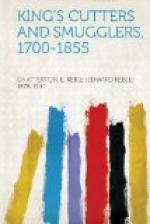What I am anxious at first to emphasise is the fact that, although smuggling rose to unheard-of importance as a national danger during the eighteenth and nineteenth centuries (and this is the period to which we shall especially address ourselves presently as affording the fullest and the most interesting information on an ingenious phase of human energy), yet it was not a practice which suddenly rose into prominence during that period. Human nature is much the same under various kings and later centuries. Under similar circumstances men and women perform similar actions. Confronted with the temptation to cheat the Crown of its dues, you will find persons in the time of George V. repeating the very crimes of Edward I. The difference is not so much in degree of guilt as in the nature of the articles and the manner in which they have been smuggled. To-day it may be cigars—centuries ago it was wool. Although the golden age (if we may use the term) of smuggling has long since passed, I am by no means unconvinced that if the occasions of temptation recurred to carry on this trade as it was pursued during the eighteenth and the first half of the nineteenth centuries, there would not be found many who would be ready to apply themselves to such a task. To some extent the modern improvements in living, in education, and increased respect for lofty ideals would modify this tendency; and long years have awakened so keen a regard for the benefits of law and order that the nefarious practice might not break out immediately on a large scale. But when we speak of smuggling it is perhaps more correct to speak of it as a disease which has not been exterminated from the system, but is, as it were, a microbe that is kept well under control and not allowed to spread.
Everyone who is familiar with English history is aware of the important position which was occupied by the wool trade. Because of the immense value to the nation of the fleece it was necessary that this commodity should be kept in the country and not sent abroad. If in the present day most of our iron and coal were to be despatched abroad regardless of what was required by our manufacturers it would not be long before the country would begin to suffer serious loss. So, in the thirteenth century, it was with the wool. As a check to this a tax was levied on that wool which was exported out of the country, and during the reign of Edward III. attempts were made by the threat of heavy penalties to prevent the Continent from becoming the receptacle of our chief product. But the temptation was too great, the rewards were too alluring for the practice to be stopped. The fleece was carried across from England, made into cloth, and in this state sent back to us. Even in those days the town of Middleburgh, which we shall see later to have been the source of much of the goods smuggled into our country in the grand period, was in the fourteenth century the headquarters abroad of this clandestine




